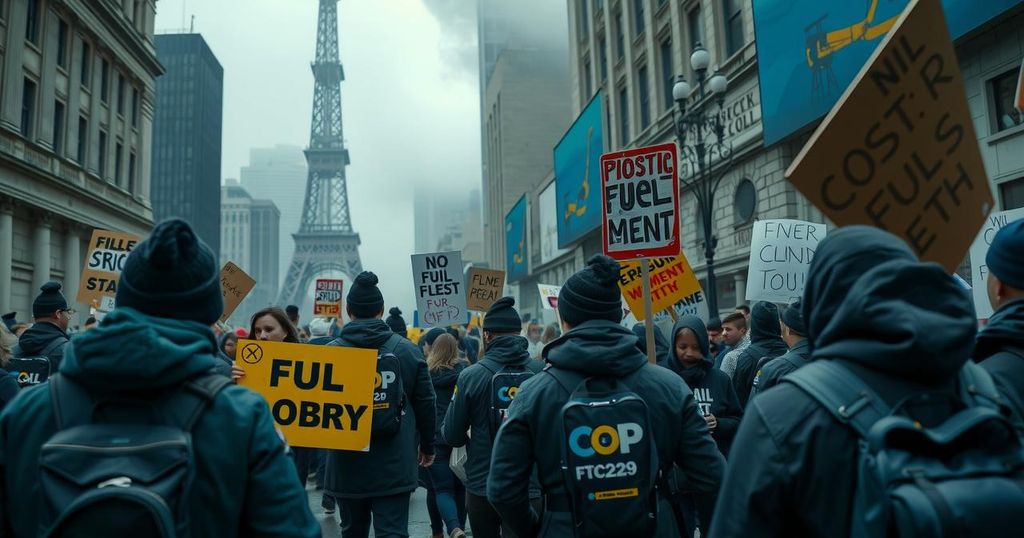COP29 Highlights Top Polluting Cities Amidst Activist Anger at Fossil Fuel Lobby

At COP29, data revealed that top greenhouse gas-emitting cities are primarily in Asia and the United States. While oil companies committed $500 million to sustainable energy, the presence of fossil fuel lobbyists faced criticism from activists. Calls for overhauling climate talks are growing, amid urgency for developing nations’ support and climate financing.
Recent data presented at the COP29 climate summit in Baku highlights that major cities across Asia and the United States are the leading contributors to greenhouse gas emissions. According to findings from Climate Trace, seven regions emitted over 1 billion metric tons of these gases, predominantly from China, with Shanghai being the largest emitter, producing 256 million metric tons. While significant investments—$500 million—were pledged by oil companies for sustainable energy initiatives, the overwhelming presence of fossil fuel lobbyists at the conference sparked criticism from environmental activists, who argue that these interests undermine the negotiations aimed at combating climate change. The urgency of the climate crisis was further underscored by a report stating that countries need to invest more than $6 trillion annually by 2030 to avert drastic consequences. As delegates discussed financial commitments from wealthier nations to assist developing countries, the atmosphere was marred by tensions and public withdrawals—most notably Argentina’s exit from the summit. Activists have voiced concerns regarding the influence of fossil fuel entities on climate talks, likening their presence to that of tobacco lobbyists at a health conference. Leading environmental figures have called for significant reforms in the climate negotiation processes to maintain their integrity and efficacy. The framing of climate discussions, particularly in light of advancements in fossil fuel technologies and production, remains contentious. Earlier events, including COP28 hosted by an oil-rich nation, have seen similar criticisms echoed by prominent figures like former Vice President Al Gore and various climate activists. At the heart of the debate is the need for substantial financial support from affluent nations, which is essential for empowering vulnerable countries to effectively address the challenges posed by climate change. However, with the pervasive influence of fossil fuel lobbyists, reaching consensus on pivotal agreements appears increasingly daunting, complicating the collective mission to mitigate climate change effects.
The context of this article revolves around the ongoing discussions at the 29th Conference of the Parties (COP29) to the United Nations Framework Convention on Climate Change, where climate activists and officials convene to address the global climate crisis. COP meetings focus on scrutinizing emission data, discussing financial commitments from developed nations, and strategizing collective action against climate change. The current COP has been marked by significant tension concerning the influence of fossil fuel industries within these vital discussions, which critics argue undermines the intended purpose of the negotiations and responses to climate change.
The revelations at COP29 about significant greenhouse gas emissions sourced from major cities have intensified the outcry over fossil fuel lobbyists’ involvement in climate talks. Despite pledges for sustainable energy investment, activists caution that the presence of these lobbyists poses a threat to the negotiations meant to combat climate change. The need for increased financial commitments from wealthier nations is critical, yet the ongoing struggle with fossil fuel interests complicates the pursuit of meaningful climate action. As the summit progresses, the call for reform remains essential for the integrity of future climate discussions.
Original Source: www.aljazeera.com






